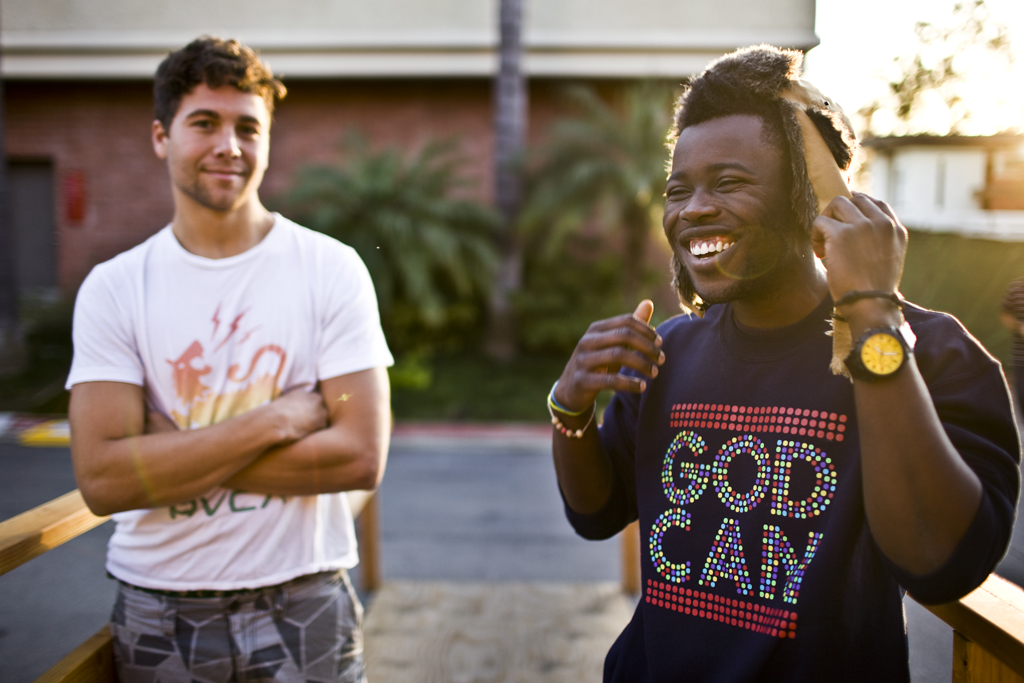He and Colin Cabalka, also in line for questioning, had just received word earlier that day that their film “Why Biola Rocks” had won first place in the U.S. News and World Report contest. They were going to France. How could life turn from euphoria to nightmare so quickly?
Sitting alongside Katie Powell, resident director of Horton South, he was the first of the four friends to be questioned. They hadn’t found much. It was all up to him. Would he deny it? Would he launch into a confession and include Cabalka, Daniel Han and Clay Fisher in it?
Feeling angry and betrayed, Fajinmi wrestled with those questions as he considered their futures on Nov. 11, 2008. It would become a day ingrained in all their memories as the day they were caught for doing marijuana — and the day when the process of redemption and healing began.
At first, he denied it. He denied all of it.
Spiraling Downward
It hadn’t started out as much, the drugs. For Fajinmi, it began with alcohol, then drugs toward the end of high school. It wasn’t heavy — just occasional. Ironically for him, drug use didn’t become habit until Biola. Cabalka didn’t smoke weed until coming to Biola. Han tried drugs as a one-time thing between eighth and ninth grade, then smoked occasionally his second semester at Biola.
At first, it was mostly a weekend deal for the four of them. It had to stop, they knew. And they tried, but it never lasted long. Returning from summer break after their freshman year, they committed themselves to staying clean. But it didn’t last. Weeks into the semester, the addiction surfaced again. And this time, it was stronger than ever.
“It just kind of crept up on us,” Fajinmi remembered. “It got really bad.”
Smoking ceased to be an infrequent past time and assumed the form of an interfering, all-consuming addiction — an almost-nightly habit. Cabalka remembered skipping classes to smoke a joint off campus, and sleeping through classes to wear off the effects of the potent drugs.
“It stopped becoming just an escape and started becoming who we were,” Cabalka said.
As the habit became ever harder to disguise, they gained a reputation among some as the hard-core partiers. The judging, hypocritical eyes of others, even other Biola partiers, bored into them.
Soon, smoking led to stealing, too. It simply came with the culture.
“I knew that I was living two lives, and I didn’t want them to connect,” Cabalka recalled. “I wanted to have my party lifestyle on the side, and I wanted to have my real normal Biola lifestyle so that people at Biola thought that I had everything together… But when you’re trying to balance both lifestyles, eventually, they connect somewhere.”
Finding Friendship
But smoking wasn’t just an escape or a lifestyle — it was a way to bond. Fajinmi and Cabalka had known each other for years. Han and Fajinmi were longtime friends, too. Fisher was the newest addition. Together, they would set off on long boarding adventures to somewhere, anywhere. They were practically inseparable, the four of them.
“We were like the three musketeers, but with four people,” Fajinmi remembered.
In a sense, both the fellowship and the drugs were an attempt to fill an aching hole, a hole Cabalka said they didn’t know how to fill otherwise.
For Han, smoking weed with his buddies brought liberation from a life of expectations in the Biola culture.
“It was very, very bonding,” Han recalled. And it’s amazing because you feel very freed of being in this cookie-cutter mold.”
The four of them justified their behavior. After all, they weren’t really hurting anyone else. They weren’t doing “hard” drugs. Sometimes, they even discussed deep theological issues, like salvation — their own salvation — while high. Were they really saved? Could God take them back?
“In the furthest, most backside compartment of my brain, I knew it was wrong,” recalled Han. “But I couldn’t see that because I was having too good of a time in a worldly sense, just gratifying and satisfying my flesh. I enjoyed what came of it, the experience.”
Changing Course
But that lifestyle came to an abrupt end Nov. 11, 2008. When Powell urged Fajinmi to allow God to work, he realized resisting was useless.
He broke. It was all over.
“My world just seemed to explode, almost,” said Cabalka, remembering that day.
They would be looked down upon in the community where they each held respected positions on campus — on the lacrosse team and in SOS and in Associated Students. Even worse, how could they bear to explain themselves to unsuspecting, trusting parents?
“No one goes to Biola, no one goes to college with the perspective of, ‘Oh, I’m probably going to get kicked out,’” Cabalka said. “Everyone hopes to graduate, everyone hopes to slide by, to go under the radar if they have to. But no one thinks of that moment when you have to admit complete failure.”
That night, Fajinmi, Cabalka, Han and Fisher ventured up to a hill in Whittier where they pondered the future, smoking as they talked. As they would be told after meetings with Residence Life and Student Development staff members, they would be allowed to finish up the remaining weeks of the semester. But past December, they would be suspended for an entire year, and allowed back only after fulfilling a lengthy list of requirements.
They had to change, and they knew it. But not only that — they longed to change. This time, somehow, was different.
“We all just kind of made a decision on that hill that night that we would stop,” Han said — cold turkey.
And as they drove off in Fajinmi’s black Honda Civic, the four friends tossed the pack of cigarettes out the window in a symbolic gesture.
They didn’t look back.
And from there, their four stories diverged.
Part two of the story coming Dec. 2







